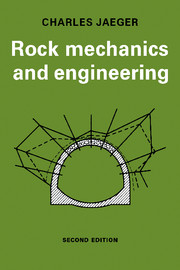Book contents
- Frontmatter
- Contents
- Preface
- Preface to the first edition
- Part 1 Introduction to rock mechanics
- Part 2 Rock material and rock masses
- 3 Fundamental concepts and description of fissures
- 4 Physical and mechanical properties of rock material
- 5 Residual stresses in rock masses in situ
- 6 Strains, modulus of deformation and failure in rock masses
- 7 Mathematical approach to strain–stress distribution in rock masses
- 8 Interstitial water in rock material and rock masses
- Part 3 Rock mechanics and engineering
- Part 4 Case histories
- References
- Appendix 1 Comments on the bibliography
- Appendix 2 Measurement conversion tables
- Appendix 3 Table of geological formations and earth history
- Appendix 4 Some petrographic properties of rocks
- Author Index
- Index of geographical names, dam sites, reservoirs, tunnels and caverns
- Subject Index
6 - Strains, modulus of deformation and failure in rock masses
Published online by Cambridge University Press: 04 August 2010
- Frontmatter
- Contents
- Preface
- Preface to the first edition
- Part 1 Introduction to rock mechanics
- Part 2 Rock material and rock masses
- 3 Fundamental concepts and description of fissures
- 4 Physical and mechanical properties of rock material
- 5 Residual stresses in rock masses in situ
- 6 Strains, modulus of deformation and failure in rock masses
- 7 Mathematical approach to strain–stress distribution in rock masses
- 8 Interstitial water in rock material and rock masses
- Part 3 Rock mechanics and engineering
- Part 4 Case histories
- References
- Appendix 1 Comments on the bibliography
- Appendix 2 Measurement conversion tables
- Appendix 3 Table of geological formations and earth history
- Appendix 4 Some petrographic properties of rocks
- Author Index
- Index of geographical names, dam sites, reservoirs, tunnels and caverns
- Subject Index
Summary
General remarks
Tests carried out on samples have shown the complexity of rock behaviour when under strains and stresses. It has been proved that deformations, strength and rupture of rock material, depend on the degree of fissuration of the sample, the porosity and water content and the dispersion of the test results. Griffith's theory is at the root of the problem of rupture of rock material.
Rock material can be used as small-scale models of rock masses. But microfractures and geological faults, bedding and stratification in the mass intensify the defects observed in it. Measurements of the modulus of deformation largely depend on the fractures and faults observed in the mass to such an extent that in addition to a modulus of elasticity E, a modulus of total deformation Etotal including non-elastic, non-reversible deformations of the mass must be defined, and differ from the modulus of elasticity of the rock.
Chapter 5 described how the strength of rock material depended upon microfissures and microfractures; on voids, their density and shape. It will now be seen that the strength of rock masses depends on microfractures, joints and faults.
The scale effect observed on rock material is intensified in tests on rock masses. It is of great importance when discussing test methods and results to be fully aware of the actual volume of rock mass under examination. For example, the Talobre tests with a 50-ton jack on a small bearing plate may involve a far smaller volume of rock than a large size test with 4 × 300-ton jacks.
- Type
- Chapter
- Information
- Rock Mechanics and Engineering , pp. 102 - 160Publisher: Cambridge University PressPrint publication year: 1979



